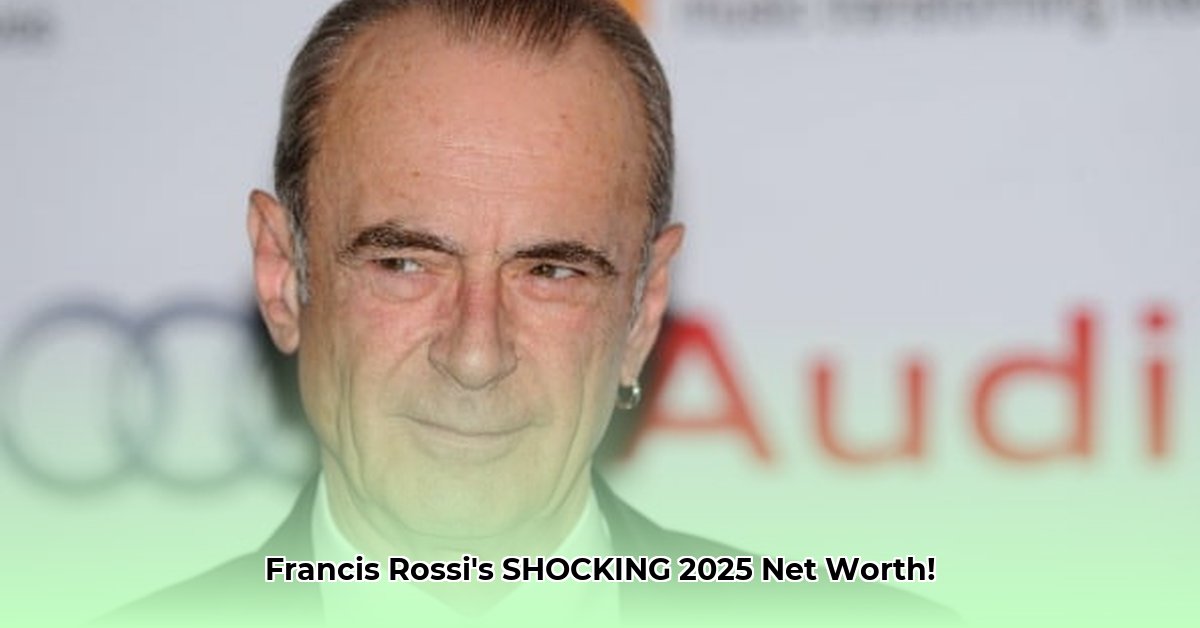
Untangling the Millions: The Elusive Net Worth of Francis Rossi
Determining the net worth of Francis Rossi, the iconic Status Quo guitarist, proves surprisingly complex. Widely varying estimates, ranging from a modest $100,000 to a substantial $8 million, highlight the challenges inherent in assessing the financial status of high-profile musicians. This discrepancy isn't unique to Rossi; it's a common problem reflecting the opaque nature of the music industry's finances and the complexities of valuing diverse income streams. This article explores the contributing factors, analyzes the conflicting estimates, and proposes a more robust approach to evaluating the financial landscape of renowned musicians.
Rossi's Rock 'n' Roll Riches: A Legacy of Success
Undeniably, Rossi's substantial wealth is firmly rooted in his decades-long career with Status Quo. The band's extensive catalog of hit songs, countless sold-out concerts, and enduring popularity form the bedrock of his financial success. While solo endeavors and other business ventures likely contribute, Status Quo remains the dominant factor in his overall net worth. The question isn't if he's wealthy, but how wealthy he truly is, a question made more challenging by the lack of publicly available financial data.
Delving into the Discrepancies: Why the Numbers Don't Align
The significant variation in net worth estimations stems from several intertwined factors. The music industry, notorious for its financial secrecy, contributes considerably. High earners often face proportionally high expenses. Extensive touring – encompassing travel, accommodation, equipment, and personnel – places a considerable drain on income. Studio time, album production, and the ongoing costs of maintaining a high-profile lifestyle further impact profitability.
Moreover, royalties and intellectual property rights present a labyrinthine complexity. Licensing deals fluctuate, and the rise of streaming services has fundamentally reshaped the revenue landscape, making consistent income forecasting challenging. Tax implications add yet another layer; taxation varies substantially across jurisdictions, creating additional hurdles in accurately calculating total assets over several decades.
Analyzing the Estimates: A Comparative Approach
The highest estimates, such as the reported $8 million figure, possibly reflect a cumulative assessment of Rossi's total assets throughout his career – encompassing property, investments, and ongoing music royalties. Conversely, lower estimations might focus on readily available cash, or "liquid assets," at a specific point in time. The lack of transparency is paramount. Without detailed financial disclosures, precise quantification remains elusive. Both high and low estimates lack the necessary granular detail for credible validation. Does this mean one estimate is completely wrong? Possibly, but we cannot conclusively claim this without more information.
A Path Towards Greater Accuracy in Celebrity Net Worth Reporting
To improve the accuracy of celebrity net worth reporting, a multi-pronged approach is necessary:
Enhanced Methodologies from Financial Experts: Financial professionals must develop more sophisticated methods for evaluating musicians' net worth. This expertise should effectively encapsulate the intricacies of music royalties, the variable nature of touring income, and less-public income streams.
Enhanced Transparency from Media Organizations: News outlets must enhance fact-checking rigor and transparency. Detailed sourcing and explicit methodologies should be standard practice. Specialized financial reporting teams within news organizations could drastically improve accuracy.
Increased Transparency from Individuals/Representatives: While unlikely, greater transparency from Rossi or his financial representatives would be invaluable. A well-structured estate plan, tailored to the complexities of the entertainment industry, would benefit both current financial wellbeing and long-term legacy.
Potential Pitfalls and Legal Considerations
Inaccurate financial reporting carries significant risks. Damaged reputation, misinformed investors, and potential legal ramifications underscore the importance of accuracy and transparency. Tax compliance is particularly crucial, given the intricacies of international tax legislation as it applies to music royalties and intellectual property. Consistent, responsible financial management is vital in this domain.
A Framework for Estimating a Musician's Net Worth
While precise figures remain elusive without access to private records, a structured approach can yield more reasonable estimates.
- Identify Primary Income Streams: Album sales, touring, merchandise, streaming royalties, publishing rights.
- Assess Secondary Income Streams: Investments, endorsements, other business ventures.
- Account for Expenses: Touring, management, legal fees, taxes.
- Adjust for Inflation: Correct past earnings to reflect current value.
- Consider Asset Valuation: Real estate, other significant assets.
- Acknowledge Uncertainties: Transparency about the limitations of the estimation is essential.
Conclusion: The Ongoing Pursuit of Accuracy
Ultimately, determining Francis Rossi's net worth isn't about finding one definitive number, but rather understanding the complexities involved. The wide range of estimates highlights the challenges in assessing the wealth of high-profile figures. Improved methodologies, increased transparency, and a more rigorous approach to information validation are all critical to bridging the gap between speculation and fact. Only a better understanding of the musicians' financial landscape combined with a more robust methodology will allow for a more reliable assesment of net worth.